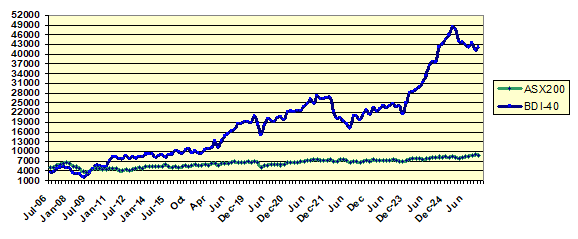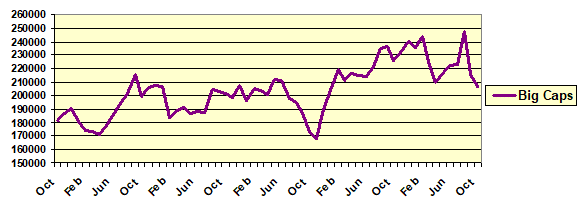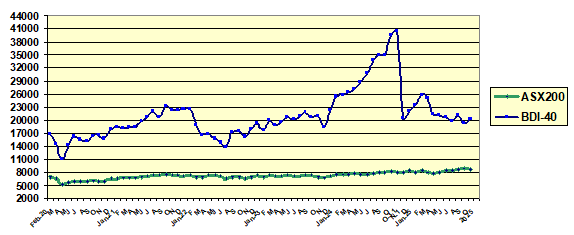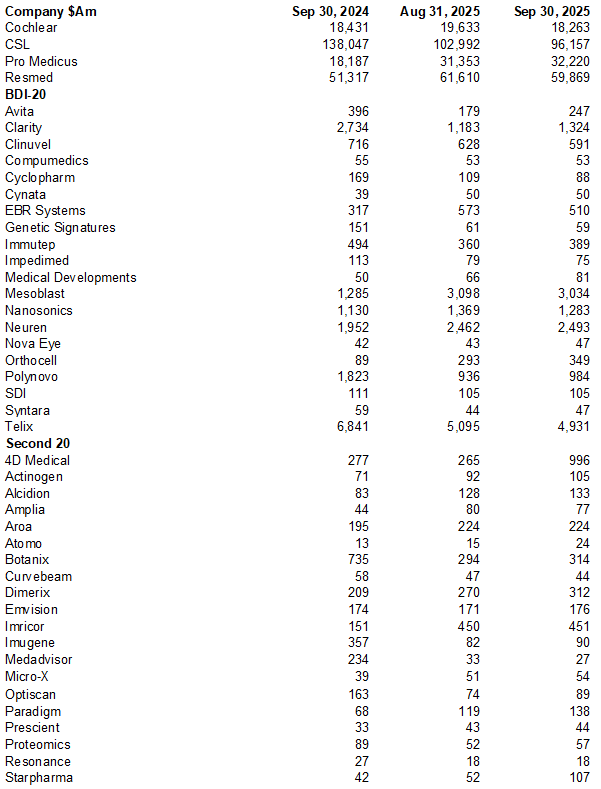Published shortly after the stock market closes five days a week - excluding public holidays - Biotech Daily is the only comprehensive daily source of information on the listed biotechnology sector.
The Biotech Daily Top 40 Index (BDI-40) is selected on the basis of interesting technologies, benefit to human health and investment potential. Market capitalization is important, but is not a sole arbiter.
2025 base-rate subscriptions are $A2,200 a year (including GST in Australia).
Subscribers include biotech directors and CEOs, major pharmaceutical companies, universities, research institutes, investment houses, market analysts, retail investors, doctors, medical specialists and hospital management.
We are living in interesting times, indeed.
The Biotech Daily Top 40 Index (BDI-40) recovered 4.5 percent in the first month of Melbourne Spring, up $874 million to a collective market capitalization of $20,220 million; while the benchmark ASX200 shed 1.4 percent to 8,849 points; and CSL fell below $100 billion for the first time since June 30, 2019.
Despite the announcement of 100 percent tariffs on pharmaceuticals by US President Donald J Trump (down from 200% in his last decree) it appears the message is being driven home that the tariffs do not have much, if any, impact on Australian biotechnology.
The four Big Caps of Cochlear, CSL, Pro Medicus and Resmed (which are not included in the BDI-40), fell a collective 4.2 percent in September to $206,509 million.
Pro Medicus was up 2.8 percent to $32,220 million; but Cochlear led the others, down 7.0 percent to $18,263 million, followed by CSL down 6.6 percent to $96,157 million and Resmed down 2.8 percent to $58,869 million.
One of the September curiosities was the unusually large number (five) of BDI-40 companies that were unchanged. Most months, there are one or two, but we believe this is the first time in 19 years that there have been five of the 40 companies unchanged.
Twenty-four of the BDI-40 companies were up, with 11 up by more than 10 percent; while 11 fell, with three down by more than 10 percent.
The September stand-out was 4D Medical, up $731 million or 275.85 percent to $996 million, not far from joining the $1 billion club, which it did, briefly, earlier this month. It was the best for two months in a row, having climbed 136.6 percent to $265 million, in August.
But it was not alone. From a low base, Starpharma more than doubled in market capitalization, up 105.8 percent from $52 million to $107 million, followed by Atomo (60%), Avita (38.0%), Medical Developments (22.7%), Optiscan (20.3%), Orthocell (19.1%), Paradigm (16.0%), Dimerix (15.6%), Actinogen (14.1%) and Clarity (11.9%).
While Telix lost the most numerically, its $164 million was just 3.2 percent down on the previous month.
Cyclopharm led the percentage falls, down $21 million or 19.3 percent to $88 million, followed by Medadvisor (18.2%) and EBR (11.0%). Medadvisor was down 88.5 percent for the year to September 30, 2025.
Cannabis Corner fell 5.35 percent in September to $283 million. Emyria was up 37.9 percent to $40 million, with Bioxyne down 24.3 percent to $83 million.
The Nasdaq Biotechnology Index (NBI) was up 4.3 percent in September to 4,880 points. On the Nasdaq Redhill, with Australian assets was up 120 percent to $11 million, followed by Eyepoint (Psivida) up 21.3 percent to $1,484 million and Queensland’s protagonist up 15.1 percent to $6,467 million. Incannex fell 20.2 percent to $75 million.



Biotech Daily editor, David Langsam, owns shares in 4D Medical, Acrux, Actinogen, Alcidion, Amplia, Clarity, Cochlear, Control Bionics, EBR, Nanosonics, Neuren, Patrys, Percheron, Polynovo and Telix, as well as non-biotechnology stocks.
Through Australian Ethical Superannuation he has an indirect interest in a range of biotechnology companies.
These holdings are liable to change:
https://www.australianethical.com.au/personal/ethical-investing/companies-we-invest-in/

